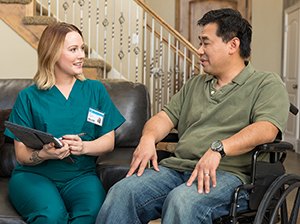Spinal Cord Injury (SCI): Emergency Preparedness
In an emergency, such as a natural disaster, people with spinal cord injury (SCI) may have additional needs to consider. Make a plan for your own safety. Preparing in advance can help you better cope with an emergency. Planning can help lessen the impact it has on your life.
 |
| Talk to caregivers about making an emergency plan. |
Know your risks and assess your needs
Start by learning about the kinds of emergencies that might affect you. This can include things specific to where you live, such as floods, earthquakes, tornadoes, and snowstorms. Fires and power outages could happen at any time. Think about how each type of emergency could affect your normal routine. Then make a list of your needs. Some questions to think about include:
-
Do you live alone or with others?
-
Does someone help you with your daily routine and activities? Will this person likely be with you in an emergency?
-
Do you use equipment, such as a wheelchair, for mobility? Will you still have access to this equipment in an emergency?
-
Do you have medical supplies that you use daily?
-
Are there medicines or other treatments that you need daily?
For each question, you need to come up with an answer and have a choice for what you’ll do instead in an emergency.
Make a plan for your safety
The Federal Emergency Management Agency (FEMA) advises that people plan to be self-sufficient for at least 3 days after a disaster. This may mean providing for your own medical needs, shelter, first aid, food, water, and sanitation. Keep this in mind as you plan for your emergency safety needs.
-
If you know that you’ll likely need help in an emergency, create a support network of people to help you in advance. Include family members, friends, neighbors, and coworkers in your network. Discuss with them ahead of time the kind of help you’ll need.
-
Talk with your healthcare provider or pharmacist about creating an emergency supply of prescription medicines.
-
Make an up-to-date list of all your prescription medicines. Include their generic names and the dosage amounts. Also include a list of your allergies. Keep a copy in your cell phone and computer. Keep a hard copy in your wallet.
-
Keep a separate supply of over-the-counter medicines. Include pain and fever relievers, antihistamines, and antidiarrheal medicines. Store them in labeled, childproof containers. Keep them where children can't reach them.
-
Keep a cooler and chemical ice packs ready. These can store and keep medicines cold if a power outage occurs.
-
Keep a list of emergency contact numbers in your cell phone and computer. Keep a hard copy in your wallet or near your land-line phone. Know how to contact members of your support network. Know how to meet up with them in an emergency.
-
Contact your local emergency services department. Find out if they keep a list of people who have disabilities or special needs. Add yourself to this list. Emergency relief workers will know that you may need more help. Find out if your building has special ways of identifying units that house people with disabilities.
-
Contact your electricity company. They may have a priority list for people who need power restored quickly in an emergency.
-
Know where the nearest emergency shelters are. Find out in advance if they are accessible with a wheelchair.
-
Know the safest places to be in your home or at work during fires, earthquakes, floods, or tornadoes.
-
Plan at least 2 escape routes from your home and job in case you’re forced to evacuate. If you live or work in a building with more than 1 floor, make sure others know how to move you safely.
-
Stay up-to-date on your vaccines for infections and illnesses. This includes tetanus and seasonal flu vaccines. Keep copies of your vaccine records with your important paperwork.
Build an emergency kit
In any emergency, you need to be prepared to take care of your own needs for at least 3 days or longer. This is in case help doesn't reach you right away. One way to prepare is to build an emergency supply kit. This kit should have basic items to help you survive, such as food and water. It should also have supplies and equipment that you need with you to help maintain your health and mobility. Also pack a small bag that contains your most needed items. Be ready to grab this bag on short notice if you have to leave your location quickly. Here are some extra things you may need in your kit:
-
Medical supplies, such as incontinence pads and catheters for bowel and bladder care
-
Assistive devices, such as glasses, hearing aids, canes, and walkers
-
Backup chargers and batteries for powered wheelchair
-
A backup manual wheelchair
-
Extra oxygen, portable generator, and portable ventilator if you need help with breathing
-
Medicines and a copy of your prescriptions
-
Medical alert card with information about your medical needs
-
Emergency contact information for family members and friends
-
Copies of important documents, such as property deeds, and health and property insurance information, and birth certificate
-
Cash, including coins and small bills
-
Food and water to last at least 72 hours
Online Medical Reviewer:
Anne Fetterman RN BSN
Online Medical Reviewer:
Joseph Campellone MD
Online Medical Reviewer:
Raymond Kent Turley BSN MSN RN
Date Last Reviewed:
8/1/2022
© 2000-2024 The StayWell Company, LLC. All rights reserved. This information is not intended as a substitute for professional medical care. Always follow your healthcare professional's instructions.